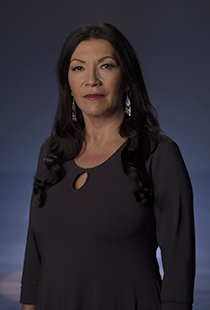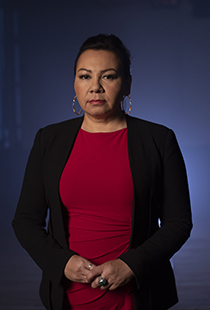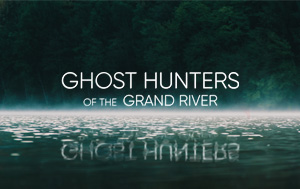
Co-Creator, Executive Producer, Director, Host
Lisa Meeches is one of the most dynamic and respected producers in the film industry, and a proud Ojibway from Long Plain First Nation. One of her recent projects, four time CSA nominee and two time winner We Were Children, is widely praised by residential school survivors for its power to heal, while general audiences have been moved by its accurate and truthful portrayal of the impacts of Canada’s colonial past.
Ms. Meeches has produced numerous projects to critical acclaim. Among them: more than 150 hours of :The Sharing Circle, Canada’s longest running Aboriginal television series; Ice Road Truckers one of the most prolific television documentary series in US television history, Tipi Tales, a Parent’s Choice award winning children’s series; and Elijah, a Gemini Award winning MOW; and the 3 times nominated 2 time winner of CSA’s JACK.
As host of The Sharing Circle, Ms. Meeches is a recognizable presence across Canada. Lisa conducts her film industry work through her three companies: Eagle Vision Inc, Meeches Video Productions, and Century Street Distribution. Other Eagle Vision Inc. productions include: Lovesick starring Jay Baruchel and Jessica Paré, Walk All Over Me, which premiered at TIFF and sold to the Weinstein Company, the politically-charged romantic comedy Blue State, and the Academy Award-winning feature film Capote.
After studying broadcasting in North Dakota, Meeches began her career in 1986 with the Winnipeg-based Native Media Network. She later began news reporting for Craig Broadcasting Systems in Manitoba and Alberta, where she established a liaison team who connected the newsroom with surrounding First Nations communities.
Lisa also devotes considerable time to other causes. Lisa has been critical to the success of the Manito Ahbee Festival since inception 11 years ago where she has acted in the capacity of board chair on a volunteer basis until recently stepping down to assume the role of Executive Director. Lisa also sits on the national board of the Heart and Stroke Foundation. True to her heritage, Lisa practices the customs of her faith and is a renowned champion fancy shawl dancer.
Lisa has been the recipient of many local, regional, and national awards for her exemplary contributions in culture, media, and entrepreneurship. Among her numerous awards and nominations are: the 2007 National Aboriginal Achievement Award for Media & Communication, the 2009 YMCA-YWCA Woman of Distinction Award in the area of Creative Communications, the 2009 University of Manitoba’s Excellence in Aboriginal Business Leadership Award and the Women in Film and Television 2009 Crystal Award for Mentorship. Lisa is married and has two wonderful sons and a beautiful daughter.

Cree Host
expansion of mandate, and financial stability. Responsibilities include budgeting, recruiting, regional representation, and serving as the national representative for Manitoba National Policy Review.As Grand Chief Manitoba of Keewatinowi Okimakana, Thompson, Manitoba George’s achievements include a Solvent Abuse Treatment Centre, a Nursing Program for Norway House First Nation, capital projects with Shamattawa/Sayisi Dene, and a child welfare jurisdiction project. George was an advocate, political representative, and negotiator for his community.
George was a Band Councillor for Cross Lake First Nation, Cross Lake Manitoba from 1987 through 1994. His achievements include providing housing, and participating in a water and sewer project. George also was responsible for child and family services, health housing, education, recreation, and finance.
George worked as a Manager for Midnorth Development Corporation, and has worked in security, and as a band constable for Cross Lake. He also has experience working in ecological monitoring in the fisheries industry.
George was trained through the Banff Management Course. He has also studied Dealing Effectively with Difficult People, and Recent Developments in Labour Law, which serve him well in his work. Through the Province of Manitoba George has studied Core Training: Supervising and Managing Group Performance, Managing within the CFS System, and Managing work Through Other People. He has studied Counselling and Community Management at the University of Manitoba, Managing and Leading in Non Profit Sector with Erhard and Associates, and Budget for First Nation through CESO.
George is passionately committed to battling the suicide crisis in his community. He speaks Cree, and promotes the survival of his language. He is a role model and inspiration for those who know him.

Cree Host
Her time at MKO was considered transformational, as she worked closely with chiefs to build a stronger foundation for MKO, with stronger governance structures and financial accountability. She is driven by her passion to create greater awareness among Canadians about Indigenous peoples, their cultures and shared history in Canada in order to move towards building relationships in the spirit of achieving true reconciliation. Under her leadership as Grand Chief, MKO released a 10-point Economic Plan for Northern Manitoba. In a press release promoting the plan, Sheila North states: “It is a myth that there are no economic opportunities in our Nations. But we do need to create the conditions to create and grow successful ventures. I’m confident our people will step up. We are ready.” That 10-point strategy came about from ideas generated in her travels throughout the region and she intends to announce similar strategies around community safety, child welfare, education, and health care. The same process is currently used to develop the Centre for Indigenous Community Development.
Prior to becoming the Grand Chief of MKO, Sheila North worked as a journalist for CBC for seven years. She has also been an entrepreneur, a Cree translator, an economic development officer, a radio personality, a Chief Communication Officer at the Assembly for Manitoba Chiefs, and as a correspondent with CTV News up until being elected as Grand Chief in September 2015.
One of Sheila North’s passions for a number of years has been working with Indigenous and non- Indigenous communities to raise awareness about the national tragedy of missing and murdered Indigenous women (MMIW). She continues to work closely with families, friends and Indigenous and non- Indigenous leaders to address the issue of violence against Indigenous women that has resulted in the current crisis. She has succeeded in engaging people in responding to the critical issue of MMIW through a variety of means, including her most recent project —a documentary she co-produced with Leonard Yakir titled “1200+” that highlights some of the systemic issues that place Indigenous women at greater risk for violence and sexual exploitation.











